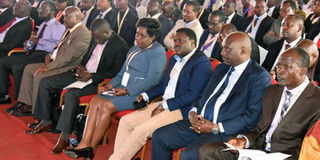Devolution laws under review, says CS Eugene Wamalwa

A section of governors and participants at a past devolution conference. MPs are reviewing some devolution laws to improve working relations between county and national governments. PHOTO | FILE | NATION MEDIA GROUP
What you need to know:
Several gaps have been identified in the current laws, according to Cabinet Secretary Eugene Wamalwa.
- The changes are in line with similar proposals sought by the Council of Governors.
- There are other proposals to amend the County Government Act so that deputy governors are assigned particular roles.
MPs are reviewing some devolution laws to improve working relations between county and national governments. The move is also aimed at easing the implementation of devolution.
Although the realisation of devolution since 2013 has been largely successful, several gaps have been identified in the current laws, according to Cabinet Secretary Eugene Wamalwa.
Mr Wamalwa said some of the legislation currently under review are the County Government Act, 2012 and the Intergovernmental Relations Act, 2012.
The Nation has learnt that the changes are in line with similar proposals sought by the Council of Governors.
“We have embarked on amending the existing devolution laws where necessary and enacting regulations to encompass intergovernmental institutions, which have not been elaborately covered by the existing laws,” Mr Wamalwa told participants at the fifth East African Local Government Forum.
COOPERATION
A key plank of these recommendations is to strengthen the role of the Senate, whose primary mandate is to protect interests of counties and their governments.
The Intergovernmental Act establishes a framework for consultation and cooperation between the national and county governments, and amongst the devolved administrations.
Though it has deficiencies in terms of its scope and drafting, it attempts to address systemic disputes which often arise between and among different levels of government, arms of government and other public institutions mandated to serve the people.
It also establishes mechanisms for the resolution of intergovernmental disputes. The CS said his ministry is also developing Alternative Dispute Resolution regulations to guide the solving of disputes that have arisen between the national and county governments or within the counties themselves.
EFFECTIVE SERVICE DELIVERY
Nandi Governor Stephen Sang, who is also CoG’s Intergovernmental relations committee chair, said there are still many challenges in the implementation of devolution, which hamper effective service delivery, and they need to be rectified in the law. He cited inadequate funding of counties.
“Strengthening institutional frameworks can accelerate the implementation of devolved governance,” Mr Sang said.
There are other proposals to amend the County Government Act so that deputy governors are assigned particular roles.
The deputies want to oversee the implementation of development projects as outlined in manifestos they launched with their respective governors.
In the proposed changes, they want to be involved in coordination of departmental functions and staff evaluation in the counties.
Apart from proposing the formation of a council of deputy governors, the Intergovernmental Relations Bill seeks the creation of a council of county assemblies.





